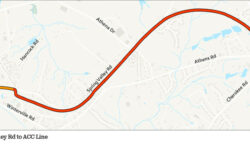Hundreds of local residents serve on dozens of volunteer boards that advise the Athens-Clarke County Mayor and Commission on various issues from transportation to tree policy, but as last week’s meeting showed, commissioners don’t always trust their advice.
Before a vote on raising the county’s stormwater fee, member Cassidy Lord explained the role of the Stormwater Advisory Committee. “You are all very busy, too busy to become experts in all the matters you address, and you asked us to become experts in stormwater, to provide you with vital guidance and recommendations, and we did,” she told commissioners. “… I hope you take it under consideration that these recommendations are coming from a group that you tasked with this charge.”
In this case, the commission did, tentatively voting 6–3 to raise the fee, currently about $40 for the average homeowner, by about $10 a year, the first such increase since 2005. The Stormwater Advisory Committee recommended the fee hike because the county has fallen behind on stormwater drainage projects, with a $16 million backlog, according to Manager Blaine Williams. Recent storms caused flooding that undermined roads, such as a giant sinkhole on Olympic Drive that forced its closure for several months earlier this year. The additional revenue will also allow ACC to provide a higher level of service, for example by helping homeowners with drainage problems on their property under certain circumstances, whereas currently the county only works within the public right-of-way. A proposal for a bond issue will come to the commission at a later date.
The federal 1987 Clean Water Act mandated that urban communities form stormwater management plans to prevent runoff from carrying pollution into rivers and streams. In 2005 the commission opted to fund the plan with a fee, rather than property taxes, so that tax-exempt entities like the University of Georgia would share in the expense. The fee is based on square footage of impervious surfaces like roofs and driveways, which prevent the soil from naturally absorbing rainfall. While ACC was one of the first governments to adopt such a fee, more than 80 Georgia communities now charge one, and most are higher than Athens’.
Commissioners Patrick Davenport, Melissa Link, Allison Wright, Dexter Fisher, Jesse Houle and John Culpepper voted in favor of the hike. Commissioners Mike Hamby, Ovita Thornton and Carol Myers voted no because they wanted to delay the vote by a month. Commissioner Tiffany Taylor was absent.
After delaying a decision twice over the past month, the commission voted unanimously to approve a $25.8 million bond issue for the Classic Center arena, the third such bond issue for the $151 million arena. But the nod came with a caveat—Hamby’s commission-defined option also created a “Bond Oversight Committee.” This despite the fact that the bonds are already overseen by the Classic Center Authority appointed by the mayor and commission, as well as the mayor and commission itself.
The arena is an example of the commission ignoring advice from advisory groups it appoints. The SPLOST 2020 project selection committee did not recommend funding the arena through a sales tax referendum, but a majority of commissioners added it onto the project list anyway.
The creation of the Bond Oversight Committee spurred Thornton—who is often skeptical of or hostile toward walking and biking—to suggest an oversight committee for Athens in Motion, an advisory board for bike and pedestrian transportation projects. Houle called AIM “a committee that we appoint to essentially be our oversight committee for transportation projects,” and all of its recommendations go through the mayor and commission for final approval. The mayor and commission has gone against AIM recommendations in the past, such as with the Barber Street multi-use path.
Thornton’s comments came during a discussion on amending AIM’s bylaws. The commission voted to allow the group to meet with a lesser quorum, pending a review of all boards and authorities by the commission’s Government Operations Committee.
In other business, the commission approved the following: a rezoning for the former Synovus bank on Prince Avenue to turn it into a restaurant, a cell tower on Highway 29 near Kroger where reception is often spotty, public art for the arena and solar panels in the ACC Library parking lot, which will require cutting down 12 trees. (Former commissioner Russell Edwards questioned why the panels could not be built over parking spots instead.) In addition, the commission renewed the Neighborhood Leaders program and adjusted the downtown “parklets” program to restrict what kinds of semi-permanent structures restaurants can build in on-street parking spaces.
Like what you just read? Support Flagpole by making a donation today. Every dollar you give helps fund our ongoing mission to provide Athens with quality, independent journalism.









